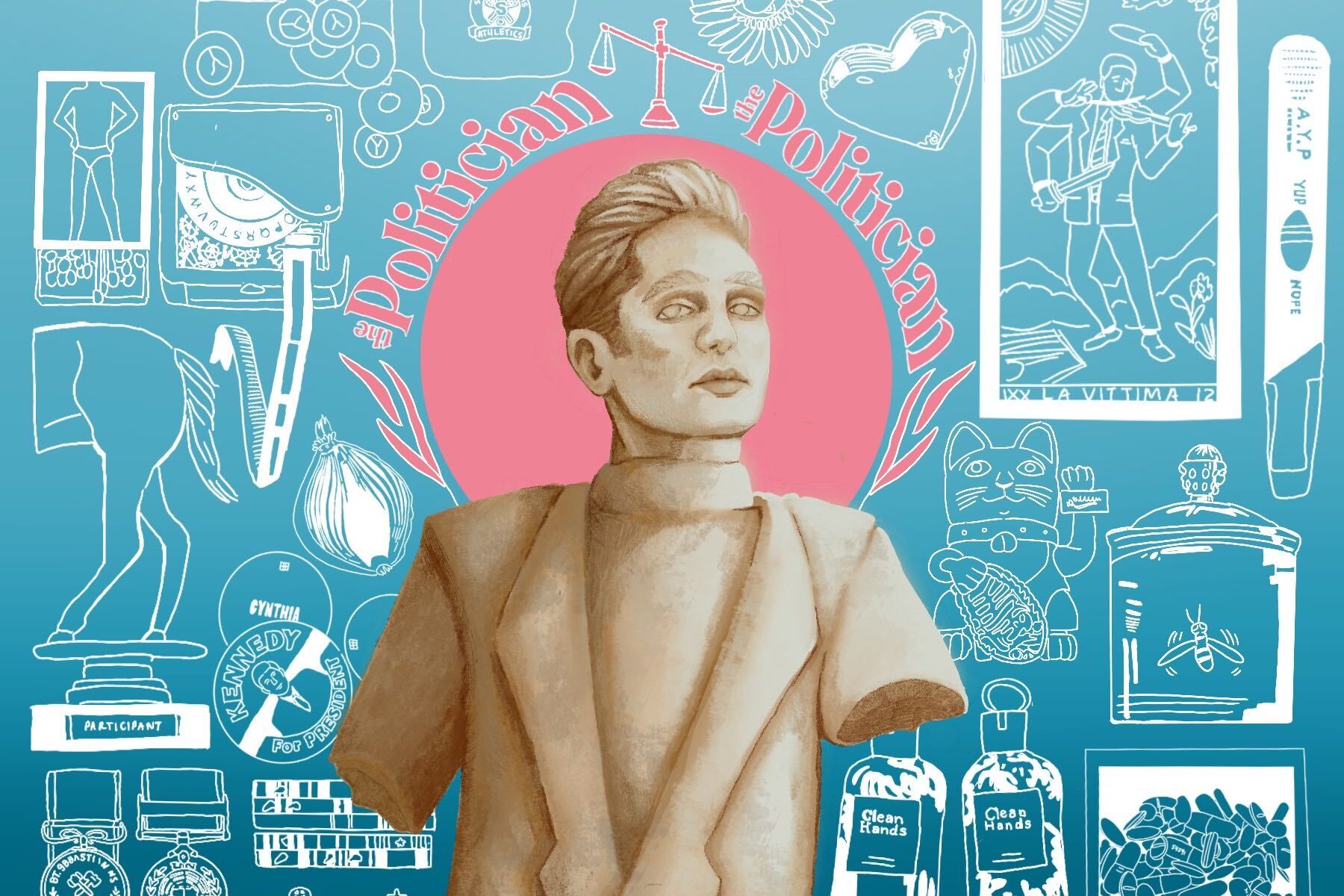Rule of thumb: The sequel is never really better than the original. What starts as a bright idea is exhausted in its first iteration, and often, it fails to be reignited for the second.
Season 1 of Netflix’s “The Politician” began with that bright, shiny idea. With the help of a cutthroat group of high school political animals, a ruthless young White House-hopeful (Payton Hobart) runs an ambitious and highly toxic campaign to win the student body president seat. Hijinks ensue. There’s a few gratuitous musical numbers, an extramarital lesbian affair featuring Gwyneth Paltrow, an assassination attempt, more than a few threesomes, and a case of Munchausen syndrome by proxy at the hand of grandmother Jessica Lange.
It’s all a very clever way for creators Ryan Murphy and Brad Falchuk to show how very absurd the world of teenaged politics can be. The show demonstrated artfully how deep seated moral ambiguity creates politically-savvy people-pleasers like Payton Hobart.
https://www.youtube.com/watch?v=e-wH7hD9Liw
What, then, is the value of a second season? Season 2 begins with a handy time skip to Payton Hobart’s second year at New York University, where the protagonist is campaigning against long-time incumbent New York state Senator Dede Standish (Judith Light).
While the election story is familiar, the themes of Season 2 attempt to elevate the stakes and cast the sequel in a modern, timely lens. Whereas the first season aimed to explore Payton and his many moral failings as a twist on coming-of-age stories, the second season is referred to as a “love letter to Generation Z.”
The state Senate election at the core of the plot becomes the ultimate tug of war between an incumbent Standish, whose progressive politics of the past no longer align with the leftist youngsters of NYC, and Gen Z savior Hobart, whose climate change agenda rallies higher voter turnouts than ever before. Even when (spoiler alert!) the election ends in a tie, Gen Z is fervently given the win. Dede Standish voluntarily turns the reins over to Payton as she publicly recognizes the need for youth representation in politics.
It’s a lovely sentiment, albeit one that paints today’s political struggles with a rather rosy lens.
Murphy and Falchuk make the “Gen Z versus everyone else” angle work as the connecting thread of the season on some levels. At the very least, it’s a great way to make common-sense legislation surrounding climate change more understandable in the easy-to-swallow form of a television show. While the depths of Payton’s personal activism can be questioned, the triumphs of the generational battle are demonstrated more so in the background characters’ convictions.
Gen Z is portrayed as a unified front, banding together in an uplifting fight for a just future. When Payton ultimately does get the votes he needs by registering hundreds of first-time voters, the message reads clearly: This generation has the numbers, and the power, to enact real change.
The best episode of the season is arguably Episode 5, titled “The Voters.” While last season’s similarly titled episode, “The Voter,” followed the story of a disenfranchised, apathetic high schooler being courted by both sides of the student body presidential campaign, this season’s installment featured a multi-generational story of a mother and daughter as they tensely navigate the political landscape of the state Senate campaign.
The older of the duo, Andi Mueller (Robin Weigert), is a longtime Standish supporter. Andi is a Democrat whose loyalties lie with her incumbent because of her “real talk” and a history of championing progressive causes like abortion access. Andi’s daughter Jayne (Susannah Perkins) is a Gen Z volunteer for the Hobart campaign who requests vegan options at breakfast and seems to wax poetic about the importance of recycling. Perhaps a bit on the caricatured side, the symbolism here is explicit.
Throughout the course of the episode, the older Mueller gets an inside look at the Standish campaign and slowly realizes the importance of passing on political power to the younger generation. By the end of the episode, it is revealed that Andi also voted for Hobart, much to her daughter’s delight. The episode serves as a long-winded metaphor for the political tenet of this season: By demonstrating fervent commitments to activism and progressive ideologies, Gen Z can usher in a new era so long as an older generation steps aside.
Ms. Mueller says it best as she describes her daughter to Dede Standish and her campaign manager: “My daughter cares for the planet more than she cares about her own economic future. Unlike us. I mean, your generation, my generation. She literally does not care if she never owns a house or a car. She just wants to make sure she has clean air and water, and that we don’t end up with a climate refugee crisis.”
The climate change platform is one that unites because, as “The Politician” affirms, this generation is willing to put anything aside to provide for a collective future. It’s the classic distinction between a “we” (Gen Z) and an “I” mentality — one that older generations who have been calling the shots in New York come to recognize by the season’s end.
While “The Politician” attempts to make a case for “passing the baton” to Payton Hobart as the incarnation of the Gen Z battle for progressive causes, their reasons for doing so are unclear, leaving a lot to be desired. Climate change is the issue at the forefront of generational political battles, and it’s the one most frequently discussed by the Hobart campaign. Yet the stakes of the climate crisis are devalued at times and applied too liberally to be effective.
Climate change in “The Politician” acts as both a moral center for the Hobart campaign and as a punchline. Payton Hobart gives impassioned speeches about the existential threat of global warming yet refuses to take a cold shower to reduce his own carbon footprint. Recycling water, as per Infinity Jackson’s demands for Payton to move toward a zero-waste lifestyle, is all a big joke.
The show simultaneously exalts and ridicules Gen Z for their progressive fight, leaving the thesis of the show with a gaping hole of convictions. Not only are the politics expressed in the season overly simplistic and tainted with naiveté, “The Politician” is constantly trying to have both — grounding the show in a real cause while failing to recognize the problematic complexities that “woke” politics demand.
The resounding promise of Payton’s campaign feels more like an affront to the Gen Z voters the show’s creators attempt to champion. Gen Z, “The Politician” says, has the mobilization capacity to make change; thus, it’s our own fault if it doesn’t go right. We don’t vote, or we’re lazy, and that’s why the planet is still messed up.
“The Politician” fails to recognize the complex systems that actively work against radical transformation in politics. It makes no reference to the work of big corporations or monetary interests in Congress, choosing instead to view climate change as a large-scale existential crisis that individual actions (like drinking recycled gray water, or “booty water” as Skye Leighton [Rahne Jones] jokingly refers to it) can fix. To actual Gen Z climate activists who know the evil forces they face are much larger than the moms like Andi Mueller who refuse to recycle, it feels like a slap in the face.
The season touches on a variety of highly “woke” topics, with climate change taking the lead. Consent, climate, abortion, ageism and sexuality are all touched upon with a surface-level approach. Yet the show paints each of these nuanced and highly complex issues with a broad brush — one with rosy hues that do little to ground the show in the reality of the Gen Z progressivism it is so desperately trying to convey.
In Episode 3, aptly titled “Cancel Culture,” Payton comes under fire for the reappearance of a childhood photograph in which he wears a Native American headdress as part of a Halloween costume. After some much-needed education on cultural appropriation by his only BIPOC staffer, Payton apologizes publicly despite facing few consequences. But “The Politician” makes a serious misstep as the episode continues by using Payton’s “cancellation” as a political ploy.
Playing the long game, Payton takes a new photo of himself in the headdress and leaks it to the rival campaign on purpose. He uses the threat of cancel culture as a political tool with which he can convince his opponent he is effectively out of the race while spying on her in the meantime. While it’s a savvy (albeit rather shady) political move, it casts a pall on the appeal to Gen Z that “wokeness” attempts to achieve.
Ultimately, it is the moral center of the show that lacks strength. Gen Z has supposedly found its champion in Payton Hobart, but the thought of an already disillusioned generation of voters picking a candidate with such a clear lack of sincerity makes little sense. The past two seasons have detailed Payton’s struggle with his own moral conscience (or lack thereof). He’s internally grappled with a series of questions: Does he do good things because he’s a good person, or because he thinks he should?
Payton’s girlfriend, Alice, wraps this up beautifully: “You only choose the path of light when you know it will get you what you want.” Combatting climate change may be a “good, progressive” cause, but there’s little evidence to suggest that Payton actually believes in it.
“The Politician” argues that his belief doesn’t matter — even in a battle of generational wills, the politics of convenience can do the trick. The ends justify the means, and politics is merely a game in which political entrepreneurs like Payton capitalize on progressive passion to get elected. That is something Gen Z should refuse to accept.
To add insult to injury, the existence of Payton as some heralded champion of progressive NYC liberals is laughable. Senate-elect Hobart is a rich, white Californian who is consistently shielded from the consequences of his actions. In no way does he acknowledge his privilege or make an effort to recognize his own hypocrisy. All the while, the show rewards him for his short-sighted nature.
He wins his election even though he was privy to voter fraud, and he gets to conveniently serve as New York state Senator despite the tie. The end of the season leaves him slated to become the next vice president of the United States, somehow still the champion of Gen Z despite his lack of passion.
The message is clear. Gen Z can be as idealistic as they want, provided that idealism takes a very specific form: a white man with a background suited to politics, with the right brand of moral ambiguity to take real passion for change and turn it into meaningless political fodder. This twisted form of encouragement not only misrepresents the politics of today, it discourages the pursuit of the politics of tomorrow.
In a tumultuous election year with more Gen Z voters than ever before, “The Politician” does us a disservice.
















